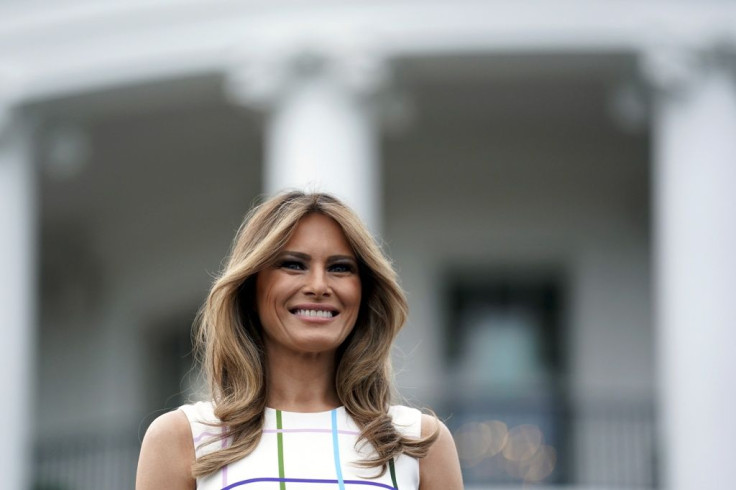Critics Blast Melania Trump's Cyberbullying Efforts With Sarcasm, Online Harassment

First Lady Melania Trump delivered a speech about cyberbullying and harmful messages on social media during a United Nations luncheon in New York last week. “We must teach each child the values of empathy and communication that are at the core of kindness, mindfulness, integrity, and leadership, which can only be taught by example,” she said. "As adults we are not merely responsible — we are accountable."
Trump herself immediately became the target of online harassment over the dramatic pink dress she wore to the luncheon.
"No child should ever feel hungry, stalked, frightened, terrorized, bullied or afraid with nowhere to turn." pic.twitter.com/Z7F6JsSvGF
— Melania Trump (@FLOTUS) September 21, 2017
Fashion statements aside, this speech was the first time during the Trump administration that she publically delivered on her campaign promise to crusade against cyberbullying. And her outfit wasn’t the only aspect of the speech that attracted criticism. Women across the country pointed out President Donald Trump has become synonymous with cyberbullying on Twitter. During the talk show "The View," Whoopi Goldberg asked if the First Lady would help delete the president’s Twitter account. California congresswomen Barbara Boxer tweeted a sarcastic reference to the president’s retweeting habits.
First Lady starts cyberbullying project after POTUS retweets of his golf ball smashing Hillary. For our women & children, good luck Melania!
— Barbara Boxer (@BarbaraBoxer) September 21, 2017
One high school blogger wrote the speech was hypocritical in an op-ed for the New York student blog the Highly Indy Project. “She might care deeply about the issue and America’s students,” the anonymous student wrote. “But when it comes to it, her husband is perhaps the biggest contemporary cyberbully of them all.”
This isn’t just about one man’s Twitter account, as powerful as he may be. Data analysis proves the president’s insults and online behavior directly correlate to waves of online harassment against the Trump family’s critics, especially women like journalist Megyn Kelly.
A study by the Southern Poverty Law Center in 2016 showed the presidential election appeared to inspire a surge in underage bullying related to students’ race and ethnicity. Politifact pointed out it’s a lot harder to prove causation in the case of student bullying, unlike the Twitter rampages.
Yet even without her husband’s dubious reputation, Trump herself has a history of ignoring the online harassment directed at her critics. When asked about white supremacists harassing a Jewish journalist who wrote an unflattering profile of the soon-to-be First Lady, Trump famously told DuJour : “I don’t control my fans” and “She provoked them.”
Trump is often criticized for her fashion choices, sometimes so much it distracts from her uniquely silent role in the White House. Cyberbullying, her chosen social cause during the Trump administration, is an issue that impacts around 21 percent of American teenagers, according to student surveys by the Cyberbullying Research Center. The Pew Research Center found around 40 percent of adults have also experienced cyberbullying. Across both demographics, young women are most likely to be targeted by online harassers, especially African-Americans. Trump's speech did not mention any specific trends, solutions or behaviors related to cyberbullying.
Aside from the U.N. speech, there haven’t been any hints as to how Trump plans to continue her anti-bullying campaign. To the contrary, she has remained largely silent about tech company policies and harmful online trends, including people who use her image online to defame black women like Michelle Obama. Even last week's speech avoided specific language, relying heavily on clichés such as the "golden rule" of treating others they way we want to be treated ourselves. Measuring Trump by her own advice to lead by example, so far the First Lady's approach to combatting online harassment is to ignore it.
© Copyright IBTimes 2024. All rights reserved.











